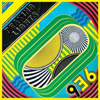Peaking Lights, "936"
 This husband-and-wife duo has been lurking around the cassette underground and amassing an enthusiastic following for several years, but their work has always been a bit too abstract and lo-fi to make a big impression on me.  That has now changed, as 936 is a massive leap forward, artfully shaping the band's noisy, experimental impulses and long-standing love of dub into a batch of killer, bass-heavy, hook-filled songs.  I am absolutely obsessed with this album.
This husband-and-wife duo has been lurking around the cassette underground and amassing an enthusiastic following for several years, but their work has always been a bit too abstract and lo-fi to make a big impression on me.  That has now changed, as 936 is a massive leap forward, artfully shaping the band's noisy, experimental impulses and long-standing love of dub into a batch of killer, bass-heavy, hook-filled songs.  I am absolutely obsessed with this album.
Interestingly, Peaking Lights' first full album (2009's Imaginary Falcons) already had basically all of the elements in place that make 936 so great: Indra Dunis' deadpan melodic vocals, structured songs, strong bass lines, cool instrumental hooks, fluttering electronic weirdness, etc.  The only catch was that they were seldom all in place at the same time (and that the album sounded like it was recorded at the bottom of a damn well).  Essentially, the only thing that has changed is that Dunis and Aaron Coyes have merely found a more optimal way to present their great ideas.
One of the great truths in music is that experimentalism is much more palatable when a song has a good beat, a revelation that Dunis and Coyes seem to have taken to heart.  Aside from the ambient-dragged-through-the-mud instrumental "Synthy" and the wistfully swaying "Key Sparrow," every single song boasts a fat, propulsive bass line and a charmingly ramshackle drum machine beat (or an utterly ravaged live drumbeat). Both tend to be very simple, but very insistent and effective.  One song ("All the Sun That Shines") betrays an obvious reggae influence, but the duo otherwise do a pretty remarkable job in distilling the best elements of Jamaican music into their own unique aesthetic.  At the very least, the music tends to be punky and under-produced in a way that no reggae albums ever are.
Also important is the fact that Aaron and Indra have grown quite a bit as songwriters.  936 is absolutely packed full of great, understated hooks and strong, sultry vocals.  Indra has some serious presence.  Coyes, for his part, displays an impressive intuitive understanding of how to balance rough, damaged, and low-budget sounds with surprisingly deft delay-heavy guitar hooks and muscular bass playing.  Songs this catchy and soulful do not generally come out of the underground–this album sounds like a great lost new wave record slathered in grime and subtly hallucinatory weirdness.  Everything flows nicely without sacrificing any bite or grittiness.  This isn't a clever pastiche or retro-nod, but an inspired and brilliantly executed synthesis: these are sounds that were meant to be together.
Aside from "Marshmallow Yellow," which seems a bit listless to me, I am completely in love with every song on this album.  I probably seem a bit evangelical or over-effusive, but everyone that I have talked to about this album has had a very similar take: 936 is something quite singular and likely to be one the best albums of the year.  My only grievance is that the vinyl version omits two pieces, one of which is the final song, "Summertime."  For the record, "Summertime" is probably the absolute best song on the album.  That leaves me utterly baffled, as I can't imagine 936 ending any other way.  That caveat aside, this is essential.
Samples:
 



